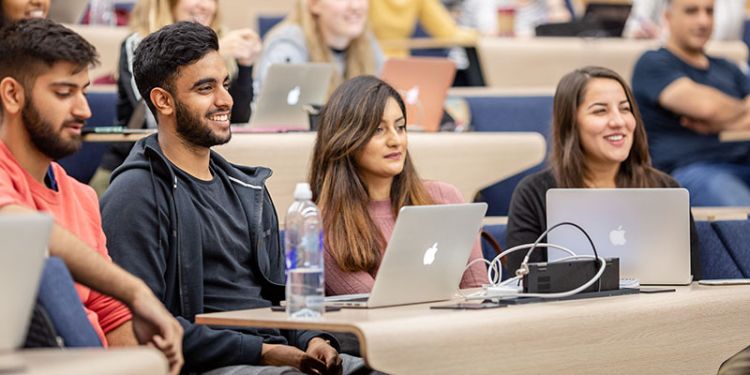Studying with us

At our School of Medicine you'll follow in a strong tradition of medical education and scientific breakthrough, learning from world-class academics at the cutting edge of research.
What to expect from our teaching
Our exciting and dynamic approach to teaching and learning is informed by the world-leading research carried out at Leeds. Bespoke one-to-one learning will guide your academic progress and personal development, ensuring that you achieve your potential.
Teaching and assessment at Leeds are based on best educational practice and we encourage early exposure to clinical settings and patient contact, which aids in the development of core consultation and practical skills.
At Leeds, our medical school has six ASPIRE-to-Excellence Awards which recognise the quality of assessment, student engagement and social responsibility on our outstanding MBChB course and over 90% of our research is rated ‘world leading’ or ‘internationally excellent’ (REF 2021).
Our teaching and learning methods include:
- Blended learning, mixing a range of self, group, and technology-enhanced approaches.
- Inter-professional learning to ensure the development of good leadership and teamworking skills with other professional groups.
- Case-based learning which will allow you to apply your knowledge to real-world scenarios.
- Integrated use of technology-enhanced learning for teaching and assessment through a virtual health community, e-portfolio and access to mobile devices in practice.
Ultrasound clinical skills
Leeds is the first medical school in the UK with ultrasound teaching and clinical skills integrated across the whole five years of our MBChB degree – preparing our students for a changing model of healthcare practice.
Diverse clinical placements
We offer a diverse range of clinical placements from year one through our partnerships with the major Leeds teaching hospitals, local and regional general hospitals, general practices and the community.
Patient Carer Community
With the growing emphasis on patient-centred care and communication, the General Medical Council's "Outcomes for Doctors" places patient and carer involvement at the core of medical education.
A key requirement is that MBChB graduates "make the care of patients their first concern", which is why we introduce patient contact in year one of our MBChB course. This allows you to practice skills on volunteers before applying them in real-world scenarios on placement.
Cutting-edge facilities
As a medical student, you will have access to our newly redeveloped medical school building which houses dedicated teaching facilities and resources to support and enhance your learning experience.
We're also international leaders in mobile learning; our teaching and assessment is supported by the latest cutting-edge learning technology both on and off campus, supporting you to get the most out of your time at Leeds.
Supportive environment
Medical students are faced with many challenges, both academic and personal, and we aim to provide a friendly and supportive environment from the first day of your studies.
You will be assigned a personal tutor who will work with you to ensure you're able to make the most of your learning opportunities and to help identify and address any problems.
Studying at university will the first time many of you will have lived away from home. This change can be daunting but our trained advisors will be available to help you, with 24/7 advice available on the Leeds University Union website.
Excellent career prospects
Our MBChB programme is for individuals who wish to become qualified medical practitioners – at the end of the course you will receive your MBChB (or equivalent) degree, which is a primary medical qualification (PMQ). A wide range of careers are available to you as a medical graduate, from clinical practice to laboratory-based medical research, or you may wish to be involved in the development of healthcare strategies. Whilst over half of qualified doctors are general practitioners, there are many opportunities to specialise with over 100 medical specialities available.
Qualified medics can be found working in many areas related to medicine, such as in international aid, medical journalism, medical research and education. As a qualified doctor, you will also find there are opportunities outside of medicine, such as in law and the pharmaceutical industry.
We're also very proud that many of our MBChB graduates chose to continue studying at Leeds as they pursue their dream of becoming the professionals and practitioners of tomorrow.
We are international
The University of Leeds's campus is one of the most diverse and multi-cultural in the world, with over 13,400 international students choosing to study with us every year.
Wherever you're from we'll help you settle in and make the most of your time here at Leeds.

